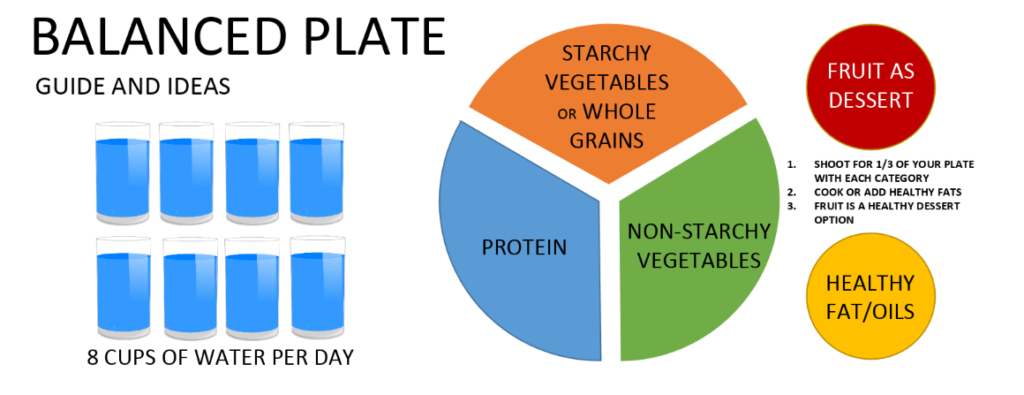The Simplest Framework for Healthy Eating
Based on the healthy eating recommendations from our interview with integrative dietitian Randy Evans, we've boiled it down to a super simple framework for how to structure your meals! Diet should be easy, delicious and make you feel great both physically and emotionally!
The Basics
Fat is not bad! Aim to have a healthy fat at every meal and snack. This is what helps you feel full and decreases the blood sugar swings and hangry moods! Examples include nuts & seeds (raw preferred as heating/roasting can degrade oils), extra-virgin olive oil, avocado oil, MCT oil, coconut oil, grass-fed butter, ghee, avocado, chia, flaxseed, and fatty fish like salmon.
Split your plate depending on your lifestyle. If you're active or a child/adolescent, go for 1/3 non-starchy veggies, starchy veggies or whole grains, and protein (as shown below). If you tend to be more sedentary, split the plate 1/2 non-starchy veggies, 1/4 starchy veggies or whole grain, and 1/4 protein. Still get a serving of fat (usually 1-2 tbsp) at each meal.
Water is super important! Especially if you decrease your overall carb intake, your body needs that water. Aim for drinking the same ounces of water as 1/2 of your body weight in pounds (i.e. a hundred pound person should drink 50 oz per day). Also, don't be afraid of salt (unless directed otherwise by your healthcare provider). When you start eating only whole foods and cut out the processed stuff, you have to add back in some of those sodium and electrolytes for your body.
You don't have to say goodbye to dessert. This is great news right?! Fruit is an awesome, fiber-full and low-glycemic dessert option. Need an idea? Try making an extra thick smoothie using frozen berries, cocoa, nut butter and almond milk for some "berry ice cream."
What's a starchy veggie versus a non-starchy veggie? Starchy veggies simply have more carbohydrates. Examples of starchy veggies would include: squash, potatoes, sweet potatoes, carrots, peas, corn (and depending on who you ask some of these could be up to debate). Non-starchy would be spinach, lettuce, brussels sprouts, cauliflower, broccoli, cabbage, mushrooms, zucchini and more.
Want to learn more? Drop a comment below!

